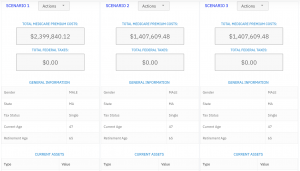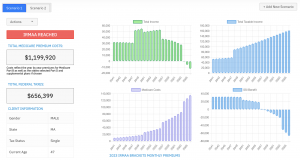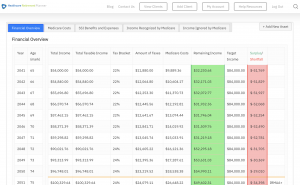you’re settling into the golden years, envisioning peaceful days ahead when an unexpected letter arrives. It’s from Social Security, and it’s about your Medicare premiums going up due to something called IRMAA. Suddenly, there’s a wrinkle in your well-laid plans.
Appealing IRMAA, or the Income-Related Monthly Adjustment Amount, isn’t just some bureaucratic shuffle—it can mean getting back that piece of your budget pie that suddenly got snatched away.
You’ve worked hard all these years; now it seems like more is being taken out each month for Medicare Part B and D. Imagine if I told you there could be a way to reduce those charges?
In navigating this twisty road, I’ll show you how life-changing events can give you leverage for appeal—and possibly put some greenbacks back in your pocket where they belong.
Understanding IRMAA and the Appeals Process
You might think of Medicare as a monolithic program, but it’s more like an onion—layers upon layers, my friend. At one such layer is the Income-Related Monthly Adjustment Amount (IRMAA), a mouthful that can bite into your budget if you’re not careful. This extra charge gets tacked onto Part B and D premiums for folks with income higher than certain thresholds.
What Triggers an IRMAA?
If you’ve felt that sting when opening your Medicare statement, chances are you’ve crossed swords with IRMAA. It swoops in like an unwanted guest when your tax return reports more dollars than Uncle Sam’s set limits allow—and let me tell ya, these limits don’t care whether those bucks came from hard work or just good luck.
The Social Security Administration doesn’t play guessing games; they use IRS data from two years back to figure out who needs to pay up. But sometimes life throws curveballs—a fancy term for “stuff happens”—and suddenly those numbers aren’t telling the current story of your wallet’s weight.
The Initial Determination Notice
A letter arrives at your door—the initial determination notice—and it’s basically Social Security saying “Hey there. Based on what we saw in black and white on that tax return, we’ve decided to charge you a bit more.” They have this power because someone wrote rules about monthly adjustments based on modified adjusted gross incomes.
If their math adds up wrong or life hit speed bumps since filing that income tax return—like losing a job or kissing goodbye to pension income—you’ve got every right to raise an eyebrow…and then some paperwork. An appeal is not only within reach; it’s encouraged if things don’t seem quite fair.
How Life-Changing Events Affect Your Medicare Premiums
We all know change is inevitable except from vending machines—but here’s how it plays out with Medicare: The SSA has its own list of plot twists called ‘life-changing events.’ Think marriages, divorces—or maybe adding some mini-mes to the family portrait—that could turn tables financially speaking so much so they’d reconsider how deep they dig into your pockets each month for premiums including drug coverage costs.
Life-Changing Event Form & Appeal Steps
Luckily, filling out a form titled as excitingly as ‘Medicare Income-Related Monthly Adjustment Amount – Life-Changing Event’ is simpler than it sounds. This document helps you report major income changes that could affect your Medicare costs. So if you’ve had a significant life event, like retirement or losing a job, this form’s for you.
Key Takeaway:
Medicare’s IRMAA might sneak up on you, hiking your Part B and D premiums based on old tax data. But don’t sweat it—if life hits a snag like job loss or retirement, waving the red flag with an appeal can help lower those costs.
How Life-Changing Events Affect Your Medicare Premiums
Say you hit a life milestone, like tying the knot or signing divorce papers. Did you know these are more than just updates to your relationship status? They’re actually big deals for your Medicare premiums too. The Social Security Administration (SSA) keeps an eye on these changes because they can shake up what’s known as your income-related monthly adjustment amount—yeah, that’s a mouthful, so let’s call it IRMAA.
You see, when life throws curveballs like spouse marriage divorce or loss of pension, SSA wants to hear about it. Why? Because if they don’t get the memo and keep using older data based on times now in your rearview mirror—that could mean you’re paying more for Medicare than needed. And nobody likes overpaying.
The thing is IRMAA isn’t static; it’s sensitive to shifts in cash flow—like involuntary loss of work—or heartwarming events such as marrying your sweetheart. It’s pegged to how thick or thin your wallet looks based on tax return info from two years back.
What Qualifies as a Life-Changing Event?
If you’re scratching your head wondering what counts here—and whether unpacking wedding gifts or adjusting after saying “I do” puts this whole thing into play—you’ll want some clarity. Well, common life happenings like marriage and its flip side (divorce), aren’t the only tickets to potential savings land.
Losing pension income employer settlement payment might sound oddly specific but imagine getting cozy with retirement plans only for them to go poof. Or consider waking up one day finding out Mother Nature has decided she wasn’t happy with where things were placed outside—yep I’m talking natural disaster impacting property loss here—they both qualify.
The SSA gives us a handy form called the ‘Medicare IRMAA Life-Changing Event’ form where we lay out our case when any eligible game-changer happens.
Making Your Case: Document What Changed
A new chapter in life means new paperwork – no surprise there. If shaking hands at work goodbye due to stoppage loss threw off those IRS numbers reflecting real-time reality—or perhaps taking vows transformed single finances into joint ones—it’s time to tell Uncle Sam all about it through documentation.
But let’s not forget Roth IRA contributions. They’re a key piece of the puzzle when you’re aiming to max out your retirement savings, especially after those life events that shake up your finances. So yeah, if diving into amended tax returns and tweaking your income gets an accountant excited, imagine what strategically contributing to a Roth IRA can do.
Key Takeaway:
Life milestones like marriage or divorce aren’t just personal updates—they can seriously impact your Medicare premiums. The SSA’s IRMAA is sensitive to these changes, so give them a heads-up to avoid overpaying. And remember, paperwork is your friend when proving life’s curveballs.
Step-by-Step Guide to Requesting a New Initial Determination
Say you’ve had a big change in your life, and it’s hit your wallet. You could be looking at the missive from Social Security concerning your Medicare premiums and pondering, “This doesn’t seem accurate.” If that’s so, it might be time to request a new initial determination.
What Triggers an IRMAA?
You’re cruising along with standard Medicare premiums when out of nowhere – BAM. – you get slapped with an Income-Related Monthly Adjustment Amount (IRMAA). So what gives? Well, if you reported more cash on your tax return than Uncle Sam’s thresholds allow – think high modified adjusted gross income levels here – they’ll tack on this extra charge faster than kids devouring Halloween candy. But hold up; all is not lost because there’s something called appealing irmaa.
The SSA takes a peek at IRS data from two years back to see how much dough you were rolling in. Let me paint you a picture: It’s like they have this financial crystal ball showing them what was going down money-wise ages ago. And based on those numbers? That’s how they decide whether or not to bump up that medicare premium through IRMAA.
The Initial Determination Notice
This little piece of paper carries some serious weight because it lays out why Social Security thinks you should pay higher premiums include stuff like pension income employer settlement payment or maybe even profits from selling off some income-producing property loss hits home too hard. Now suppose their calculations are making less sense than pineapple on pizza—well then friend, let’s talk appeals.
If the SSA sends over an initial determination notice saying “Hey buddy, we’re gonna need more money,” but deep down inside—or hey maybe just smack dab in front of everyone—you know things aren’t quite adding up since circumstances took a sharp turn somewhere along the way; then gear up ’cause it’s game time for disputing that decision.
Laying Down Your Cards: The Appeal Game Plan
- Gather Your Evidence: Think Sherlock Holmes meets tax season – before anything else starts happening make sure all documentation proving any major changes is ready-to-go like marriage divorce papers or proof-of-pension disappearance act.
- Making Moves: Grab the Medicare IRMAA Life-Changing Event form and fill it out thoroughly. Make sure to include all the recent life events that have had a major impact on your finances, so you can possibly lower those Medicare costs.
Key Takeaway:
Hit with a higher Medicare premium due to IRMAA? Gather evidence of life changes like divorce or lost pension and fill out the Life-Changing Event form to appeal. It’s your move to potentially lower those costs.
Appealing an Unfavorable IRMAA Decision
you open your mailbox and find a notice from the Social Security Administration. It’s about your Medicare premiums, and not in the way you hoped. They’ve decided to slap on an extra charge based on something called IRMAA – that pesky Income-Related Monthly Adjustment Amount.
But what if they got it wrong? Maybe they’re using older data or maybe life threw you a curveball since then, like losing a job or saying goodbye to marriage (divorce). Good news. You can appeal that decision with Social Security. So grab your boxing gloves; we’re going into the ring with bureaucracy.
What Triggers an IRMAA?
The first step is understanding why you were charged more for Medicare in the first place. Think of IRMAA as the bouncer at Club Medicare – if your income is above certain levels, he’ll ask for a higher cover charge (aka premium).
Social Security checks out your tax return from two years back to see how much dough you rolled in. If it was above their set thresholds—bam—you pay higher premiums which include both Part B and D of Medicare coverage.
The Initial Determination Notice
This notice isn’t just another piece of junk mail—it’s crucial because it tells you exactly why they think you should pay more. The SSA uses IRS data, but let’s be real: our financial lives aren’t always stable year-to-year thanks to life-changing events like involuntary loss of work stoppage or property loss due to natural disasters.
If there’s been some big change since that tax return—like retirement or becoming single again—and it affected your modified adjusted gross income significantly enough, don’t sit back.
How Life-Changing Events Affect Your Medicare Premiums
You might wonder what qualifies as “life-changing” besides getting kicked off Survivor Island. Well, say ‘I do’ one too many times? Marriage divorce could change things up financially so fast even heads spin thinking about them. Lost pension income employer settlement payment after decades slaving away at work? That’s definitely significant.
And remember Murphy’s Law where everything goes wrong all at once? Natural disaster wiped out half-town including any chance at rental income-producing property… yeah, that counts too.
If anything drastic happened along these lines recently when Uncle Sam wasn’t looking, you need action ASAP because otherwise paying IRMAA without fighting doesn’t seem fair now does it?
If you’re navigating the complexities of Medicare IRMAA (Income-Related Monthly Adjustment Amount), you might find yourself in a bit of a maze. This income-based surcharge can tack on extra costs to your Medicare Part B and D premiums if your annual income exceeds certain thresholds. It’s important to understand how this works, so let’s dive deeper.
Figuring out if you’ll be hit with an IRMAA surcharge starts by looking at your modified adjusted gross income (MAGI) from two years ago, as that’s what the Social Security Administration uses. Don’t worry if you’re subject to this surcharge; there may be ways to lessen it.
Life-changing events like retirement or losing a job can significantly alter your financial landscape. In such cases, you have the right to appeal for a new decision regarding your IRMAA charges based on more recent information about changes in your income.
The process isn’t always straightforward but getting informed is key.Medicare’s guidelines provide clarity on lowering these additional fees or contesting them effectively should circumstances change. So make sure you stay ahead of the game by keeping up-to-date with any shifts in policy or personal finances that may affect what you pay.
Key Takeaway:
Got an IRMAA hike on your Medicare? If life’s thrown you a curveball, like losing income or divorce, fight back. Appeal with the SSA using fresh info to potentially lower those fees.
Murphy’s Law hit your finances? Changes like job loss or disaster impact can help you challenge that pesky IRMAA surcharge and save money on Medicare premiums.
FAQs in Relation to Appealing Irmaa
Can Irmaa be appealed?
Absolutely. You can appeal IRMAA if life throws a curveball that shakes up your finances.
How do I appeal Irmaa in 2023?
To fight an IRMAA call, you’ll need to prove a significant drop in dough with solid evidence.
How do I fight a high income Medicare surcharge?
Tangle with that surcharge by showing Social Security they’ve got their wires crossed on your cash flow.
Is there any way to avoid Irmaa?
Dodging IRMAA takes some planning—keep income under the radar and brace for impact as retirement nears.
Conclusion
So you’ve learned the ropes of appealing IRMAA, navigating through a maze that can lead to real savings. Remember, life-changing events are your ticket to challenging an initial determination. Marriage, divorce, or loss of income—they all count.
Arm yourself with knowledge: The SSA uses older data; if your situation has changed since then, step up and make it known. Use the Medicare IRMAA Life-Changing Event form—it’s there for just this reason.
Persistence is key in these appeals. Gather documents like they’re gold because they are—proof positive that can turn the tide in your favor.
If all roads seem blocked after an unfavorable decision, stand firm and appeal again. Appealing IRMAA isn’t just about cutting costs—it’s about fairness for every penny you’ve earned and saved for retirement bliss.
Table of Contents:
- Understanding IRMAA and the Appeals Process
- How Life-Changing Events Affect Your Medicare Premiums
- How Life-Changing Events Affect Your Medicare Premiums
- Step-by-Step Guide to Requesting a New Initial Determination
- Appealing an Unfavorable IRMAA Decision
- FAQs in Relation to Appealing Irmaa
- Conclusion
Streamlining the Medicare Surcharge Calculation Process.
Our Healthcare Retirement Planner software is designed to streamline the retirement planning process for financial professionals. By providing an efficient way to calculate IRMAA costs, our tool helps you save time and focus on other aspects of your clients’ retirement plans.
- Faster calculations: Our software quickly calculates IRMAA costs based on your client’s income and tax filing status, eliminating manual calculations and potential errors.
- User-friendly interface: The intuitive design of our platform makes it easy for financial professionals to input data and generate results with minimal effort.
- Data integration: Seamlessly integrate our calculator into your existing financial planning tools or CRM systems for a more streamlined workflow.
- Easy to Understand Reports: Export reports to easily share with your clients
- Tax and Surcharge Modeling: see how different types of income affects both taxes and your surcharges.
In addition to simplifying the calculation process, using our Healthcare Retirement Planner can also help improve communication between you and your clients. With clear visuals that illustrate how IRMAA costs impact their overall retirement plan, you can effectively convey complex information in an easily digestible format. This enables clients to make informed decisions about their healthcare expenses during retirement while ensuring they are prepared for any potential changes in Medicare premiums due to income fluctuations. To learn more about how our software can benefit both you as a financial professional and your clients’ retirement planning experience, visit the features page. Streamlining retirement planning processes can help financial professionals save time and resources, allowing them to focus on other areas of their clients’ needs. Automated calculation of IRMAA costs is the next step in streamlining this process even further.






